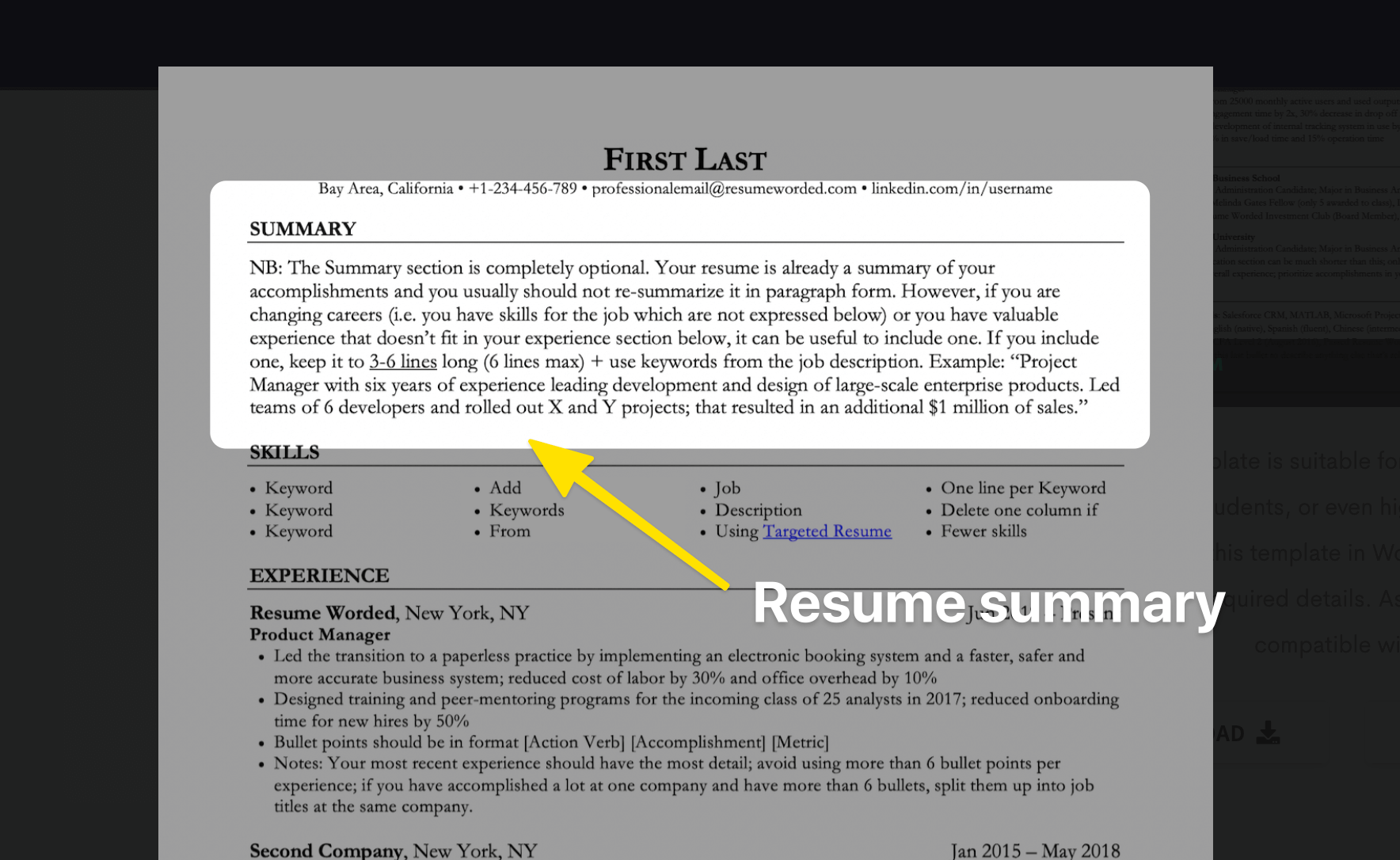Applying for jobs can feel overwhelming — especially when it comes to knowing what to put in your resume. One of the biggest questions you may have is whether they should include an objective or summary for your resume.
Before we get started, let’s clarify the difference between a resume objective and a summary.
Traditionally, the objective for a resume is focused on you. It usually focuses on their goals and desires. For example, “Seeking a challenging software development role to further enhance my coding skills.”
Alternatively, a summary highlights your professional journey and showcases how you can contribute to the company. For example, “Experienced software developer with a passion for creating innovative solutions. Proven track record of improving system efficiency by over 20%.”
In the sections below, you’ll learn whether you need a summary or career objective for your resume, as well as some best practices for crafting these sections.
Why you probably don’t need either an objective or a summary
In most cases, you can skip writing an objective or summary altogether. Here are some reasons why you probably should:
- Overlooked. Most recruiters skip over a resume career objective or summary and go straight to your work experience.
- Space usage. Objectives or summaries take up space on your resume that you could otherwise be using to highlight your experience, certifications or skills.
- Generic statements. Most objectives or summaries are vague and generic. They aren’t tailored to your employer.
- Potential for mismatch. Including an objective or summary can backfire if what you write doesn’t line up perfectly with the job you’re applying for.
When to include a summary
Of course, there are times when a summary (not an objective) might be appropriate. You should include a summary in your resume if you have a lot of experience that relates to the job you’re applying for. And if you’re a career changer, including a summary can be a productive way to explain how your previous job relates to the one you’re applying for.
Why a summary is preferred over an objective on a resume
If you want to add an introduction to your resume, a summary is more effective than an objective. That’s because objectives usually focus on how the company will benefit you, whereas summaries usually focus on how you will benefit the company.
As mentioned above, you probably don’t need to include a job objective or summary in your resume. However, if you want to include one, a summary is better. Here are some resume objective examples and summaries that highlight why.
Focus
Summary statements focus on what you offer the employer — not what you gain from the job.
- Objective: Seeking a challenging software development role where I can use my coding skills.
- Summary: Software developer with 5+ years of experience in developing scalable web applications, specializing in Java and Python. Proven ability to lead teams and projects to successful completion.
Relevance
A summary allows you to highlight your most relevant skills and achievements upfront.
- Objective: Looking to use my customer service skills in a retail environment.
- Summary: Experienced customer service professional with a track record of increasing customer satisfaction for large retail stores by 20%. Known for creative problem-solving and excellent communication skills.
Career progression
Summary statements can quickly encapsulate your career progression and success.
- Objective: Seeking a management role in the healthcare industry.
- Summary: Healthcare executive with 15 years of experience, progressing from a registered nurse to a hospital administrator. Led initiatives that improved patient care and staff satisfaction scores by over 30%.
I recommend uploading your resume to the tool below – it will scan your resume summary (or objective) and provide feedback on its relevance to your resume. Additionally, it will highlight the effective parts of your resume and identify areas that need improvement.
Who needs a summary
Some applicants can benefit from including a summary in their resumes. If you fall into one of the categories below, you might be one of them.
Experienced professionals
As an established professional, having a summary allows you to highlight your achievements upfront.
Seasoned marketing executive with over 20 years of experience in the tech industry. Led successful campaigns that increased brand visibility by 50% and contributed to a 30% growth in sales annually.
Career changers
If you’re shifting industries or roles, a summary can bridge the gap between past experience and the new job target.
Former financial analyst transitioning to data science. Leveraged advanced statistical analysis skills to guide high-stakes decision-making in past roles. Recently completed a data science bootcamp and looking to apply these new skills to help companies make data-driven decisions.
Applicants with gaps in employment
A summary can provide context around employment gaps, helping to mitigate potential concerns upfront.
Dedicated healthcare professional returning to work after a sabbatical taken to care of a family member. Kept skills updated through continuous education. Known for compassionate patient care and excellent team leadership.
Professionals targeting senior positions
If you’re aiming for a senior role, a summary can demonstrate leadership skills, achievements, and strategic capabilities.
Chief Financial Officer with 10+ years of experience in the finance industry. A strategic planner with a record of improving operational efficiency by 30%. Successfully raised $5M in company funding.
Candidates with a diverse range of experiences
If you have a diverse range of experiences across various industries or roles, a summary can help tie your experiences together and create a cohesive narrative.
Versatile professional with experience in sales, customer service, and marketing. Skilled at building relationships, identifying customer needs, and developing effective marketing strategies. Seeking to leverage this experience to drive sales growth.
If you want help crafting a compelling resume introduction, give our free Resume Summary Generator a try!










